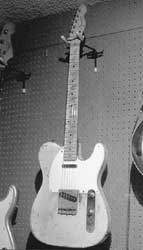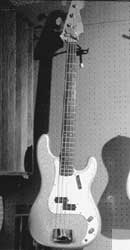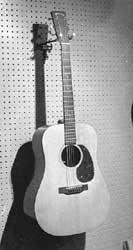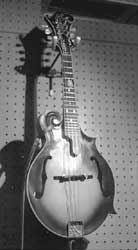The following article appeared in the August 2001 issue of Vintage Guitar magazine

Country Music Heritage (CMH) records was founded by record industry veteran Martin Haerle, who first heard American country music in the '50s on Armed Forces radio at his home in Stuttgart, Germany. By age 20, he was enough of an aficionado to move to Nashville. There, he met Starday Records president Don Pierce, whom he cajoled into giving him a job in the mail room. At the time, Starday was the Grand Ole Opry-centered home to "Mister Country Music" Cowboy Copas, the comedy of Minnie Pearl, the bluegrass of the Stanley Brothers, and the tractor-trailer tragedies of Red Sovine.
In true Geffen-esque fashion, Haerle rose in the company to the position of vice president. From there, he moved to United Artists Records in the early '70s, to run that company's manufacturing. In July of '75, with guitarist and music business veteran Arthur Smith, he launched CMH (in addition to "Guitar Boogie" and other similar hits, in '55 Smith and Don Reno wrote "Feudin' Banjos," which was rechristened "Dueling Banjos" for the '72 film Deliverance).
The company signed bluegrass legends such as the Osborne Brothers, Lester Flatt, Mac Wiseman and Carl Story, releasing double-album retrospectives of the artists' careers. And it soon became a treasure trove of great American vernacular music, including albums by Merle Travis, Jim and Jesse, Johnny Gimble, Josh Graves, Eddie Adcock and the Cache Valley Drifters. The company also developed a line of very popular multi-artist themed sets, such as Wabash Cannonball: 20 Classic Train Songs, Fiddlers Hall of Fame, 50 Years of Bluegrass (vols. I-IV), The 3 Tenors of Bluegrass, and Country Guitar Thunder. And who can forget - hard as you might try - Kazoo Christmas?
One of CMH's biggest sellers has been Doggone Country, a collection of songs about (but not by) dogs. The disk features such kibbles as "Tennesee Hound Dog" by the Osborne Brothers, "Old Rattler" by Grandpa Jones, "Dog" by the Eddie Adcock Band, and "Old Shep" from the Stonemans. A percentage of the royalties from the canine compilation goes to the Best Friends Animal Sanctuary in Utah.
Will the circle be unbroken? In 1990, Martin and his 24-year-old son, David, were hiking in L.A.'s Griffith Park when Martin, only 51, suffered a heart attack and died on the trail. The younger Haerle, then a talent agent at International Creative Management, was thrust into the record business. Because his father was a seat-of-the-pants kind of executive, when Haerle started he found sparse business documentation and a checking account balance that showed a $16,000 debt. His first move was to convince CMH's suppliers and distributors to stand by for six months while he got things organized. Next, he released the albums his father had been working on and began to absorb all he could about bluegrass music. He was lucky to have the veteran picker and producer Arthur Smith as an ally. Smith knew the music, the artists and the production process, having sired CMH recordings at his studio in Charlotte, North Carolina. Computerization followed quickly, replacing the senior Haerle's handwritten and mental notes. The company rallied, and today, CMH product can be found at local diskeries everywhere, including Tower, Virgin, Wherehouse, Sam Goody, Borders, Barnes & Noble, Wal-Mart, and Costco, as well as through the record clubs (BMG, Columbia), the e-tailers (CDNow, Amazon), the company's own website, and even in truck stops. It has spawned subsidiary labels Vitamin, Dwell (heavy metal), CMH Urban, and Bob (electronic), and its music has even turned up on movie soundtracks. CMH's current stock in trade is the tribute album. There are the Pickin' On series, the Hats Off To series, and a looser series of Acoustic Tribute To, Country Tribute To and Bluegrass Tribute To albums. All told, there are about 75 tribute titles, with more coming out every month or so. Most are for artists by name, though a few are by concept, like Pickin' On Christmas, Country Fried TV Tunes and Country Picks On Classic Rock. Some of the latest Pickin' On releases include the Byrds, Doobie Brothers, Cat Stevens, Stevie Ray Vaughan, a three-disc Grateful Dead set, and even Dave Matthews!
How does it work? Put simply, the company picks artists or concepts and "bluegrassizes" them. At first, the label just chose artists who were favorites around the office. As the concept gained momentum, more research went into which artists were most memorable to the broadest range of audiences. Next, the staff picks songs that are most representative of the artist, then assigns the project to one of its producers. The producers arrange material and choose players.
Though bluegrass purists (you know who you are) might not cotton to the presence of percussion, electricity, and major-sevenths, the music is creatively arranged and brilliantly played. Some artists' work cooks up naturally in a bluegrass recipe, like the Eagles, Dixie Chicks, Dylan, and the Byrds; others are ear-tickling surprises - Guns and Roses, Boston, Aerosmith... In addition to getting royalties for the use of their songs, the artists seem to enjoy the tributes. The top-selling disk in the series is Pickin' on the Grateful Dead, which, in testimony to its acceptance, is now sold at Grateful Dead-related events.
David West, 48, is one of CMH's producers. His studio in Santa Barbara, California, is home to a host of vintage gear that he uses for (among other things) his CMH assignments.
West has been playing stringed instruments since his early childhood in North Hollywood. He spent many years as a member of singer Kate Wolf's backup band and the Cache Valley Drifters. Then he drifted his own cache to Santa Barbara 30 years ago for its more bucolic environment. Typically, West is busier than a cat on a farmyard. We caught up with him as he was just finishing Pickin' on the Byrds and getting started on Pickin' On Bob Marley, which proved a special a challenge to arrange for bluegrass. His CMH projects usually take six to eight weeks from when he gets the assignment until he turns in the finished DAT.
"When I started doing this four years ago, I had done about 25 years of seven nights a week, twice on Saturdays, twice on Sundays, year in-year out, whether I was sick or healthy, putting 60,000 miles on my car every year from the time I was about 19. I was ready for this! It came at a time when I really needed it, and I couldn't be more thrilled. I've got the perfect job - working for a totally responsible record company full of nice people on my two favorite kinds of music, bluegrass and rock."
West usually refers to the original artist's music as he creates his arrangements, taking care to preserve melodies and signature licks. He'll lay down a scratch rhythm guitar track, then add the instruments he plays - a half dozen or so - and other players he admires. He prefers to use mics with amps or go straight into a Drawmer 1960 tube preamp (hear it on "Box of Rain," on Pickin' On The Grateful Dead, Vol. II), though he predicts he'll eventually use some of the digital amp modeling and editing tools now available.
Though he can cover a lot of the instrumental necessities, nearby Los Angeles offers a deep and very diverse pool of talent.
"I have kind of a core group of favorites, because I know I can do anything CMH asks me to do using these guys," West explains. "The biggest problem is that they're so good, they're always busy! These are people who go way over the call of duty. When the three hours is up, they don't start packing. They work until it's the way we want it.
"Tom Corbett has been indispensible. He's such a pro on guitar and mandolin - he's one of those guys who sits down and plays straight through in one or two takes. Bill Flores, a wonderful jack of all trades, is a fabulous sax player. He also plays great acoustic and electric guitar, button accordion, fiddle, pedal steel, lap steel, and is just the mellowest guy to work with. He's all over the Hats Off to Hank Williams. Al DiMarco, a brilliant session player in Los Angeles, plays piano and accordion. I try to have him on every project because he's great to work with and full of great ideas and plays just as good as anybody. There's Jay Dee Maness, who is an absolute national treasure. For Pickin' On The Byrds, he recreated the exact steel part he did for the Byrds on 'Hickory Wind.'
"Gabe Witcher (son of one of the famed Witcher Brothers) is a super musician. I use him as a fiddle player, though he's great guitar player. When I started using him, he was working with Bela Fleck, and he's now in Eve 6. Of course, I always appreciate when Chris Hillman or Richard Greene or Byron Berline comes in, and Tom Ball is on almost everything of mine, because he does such a great job and he loves the process of recording. I use him on harmonica, though he's also a good fingerstyle guitarist. Bo Fox, the drummer, has played with everyone from Yoko Ono to me!"
To give an example of the level of playing on the CMH disks, have a listen to "Crossroads" of the Pickin' on Clapton. It will likely erase the legendary Robert Johnson and Eric Clapton versions from your brain pan. "Dennis Caplinger plays an ungodly solo on it," recalls West. "He just came in, sat down, said, 'Could I borrow a guitar?' and just played nonstop, mindboggling guitar."
And on his wish list?
"I've been trying to schedule Albert Lee. He's such a sweet guy and he's always on the road. He works all the time. He has a band in Europe, he tours with the Everly Brothers, he works with Bill Wyman's Rhythm Kings. It seems like when he's home in L.A., it's when I don't have a part ready. But we're going to coordinate, eventually." West has found working on some of his projects to be personally enlightening.
"To me, one of the best perks of doing this is that I've worked on artists who I didn't originally care for," he said. "But I've learned that if somebody's really famous, there's a reason - an artistic reason. If you really study their music the way you have to for these tributes, you find out why they're so huge.
"A classic example, for me, was the band Boston. In the '70s, I didn't like them. With my West Coast sensibilities, I'd see a picture of them in their 5" platform heels and their shag haircuts and decide, (These guys can't be any good. I can't relate, they don't look like hippies like all my friends do.' A really bigoted attitude!
"So, of course, last year I got this assignment to do Pickin' On Boston. So I went and got their CDs and I was knocked out by how incredibly good they were. They were all Berklee grads, all classically trained, the leader (Tom Scholz) invented a guitar tone device just for that band. I was amazed by how good the sound was on these records and by how artfully the music was put together. The playing is just unbelievable, and so is the writing. So I felt a little stupid after first basically refusing to hear. My prejudices had gotten in the way."
So in 10 years, will we see Pickin' on Moby or Pickin' on Eminem? "I'm still trying to get them to let me do Pickin' on James Brown!" West exclaims, laughing. "I've sat and played banjo along with the original versions, and it fits like a glove! It adapts so well!
"When they gave me my first couple of records, I certainly didn't expect to be doing this four years later. As long as we keep coming up with gold and platinum-selling artists, be they Eminem or Britney Spears, hopefully there will be a Pickin' On... record on them."
For a complete catalog, write to CMH Records, Inc., PO Box 39439, Los Angeles, CA 90039, or visit cmhrecords.com.

'41 Martin D-18
"A friend found it in a case in the loft of a barn in the Paso Robles area, where it gets really hot in the summer and really cold in the winter. For 20 years, it was up in this loft. It had a couple cracks in the side, which I had repaired. Even though it's from the era where D-18s had ebony fingerboards and bridges, it weighs absolutely nothing. I use it on just about every album. It's my main guitar. I used it when I was in the Cache Valley Drifters. Stock tuners, never re-fretted. Even the pickguard is original and hasn't lost its color like they usually do when exposed to weather."
'62 Fender P-Bass
Found in a music store for $400, completely stock, with original frets. Under the black paint, he found the original sparkle finish!
'58 Telecaster
Stock, except West recently turned around the volume and tone plate so he can do volume effects with his little finger.
'72 Mike Siegel mando
West attended high school with Siegel in L.A. Siegel moved to Kalamazoo and learned mandolin building from the guys at the original Gibson plant. This is Siegel's first mandolin, which West uses on every record.
1916/'18 Gibson "A" model mando
Tuned in octaves for the Byrds tribute (check out the beginning of "Eight Miles High").
'59 Jazzmaster
...with a birdseye maple neck, to which he added a Tele-style body and Seymour Duncan Tele and Gibson P-90 pickups. Luthier Steve Triplett did the finish work.
'20s Czech flat-back double bass
Laminated, "...a more impressive way of saying 'plywood.' It has a really deep, even sound. I don't go out with it much. But once a year, Byron Berline comes through on tour and I've been playing the bass with him."
'62 Martin D-21
A cross between a D-18 and a D-28. Think of it as a D-18 made out of Brazilian rosewood instead of mahogany.
'63 Martin D-21
Used with Cache Valley Drifters and the late Kate Wolf.
'70 Gallagher
"Sometimes if I'm doing a live acoustic gig of my original songs, I'll use this."
'45 Martin 000-18
"This is a great old guitar. It really cuts through the mix using less volume."
Five-string banjo
Flat-top, similar to a Gibson Mastertone, with a Ferguson pot and neck by Bob Givens.
'35 Dobro
Steve Fishell uses it on CMH sessions.
c.1901 Thorn Ward parlor guitar
Probably related to Mongomery Ward. Experts who've looked at it think it was made by Washburn, then re-labeled. Neck has exaggerated V shape. Has a few cracks, nothing structurally threatening. Sounds clean and stays in tune. West uses it for solo fingerstyle, swing, Irish, and slack-key work.
|
|
|
|
|
|
1958 Telecaster
|
1962 P-bass
|
1941 Martin D-18
|
1972 Siegel F-5 Mandolin
|
|





